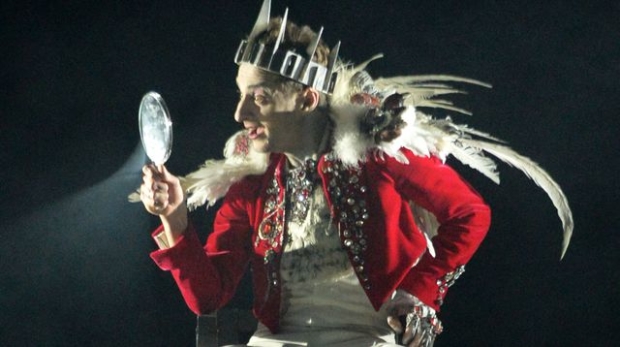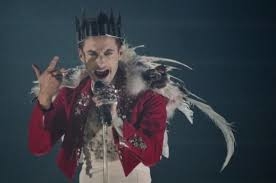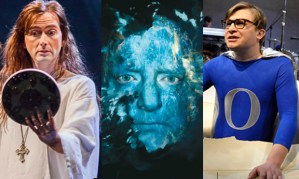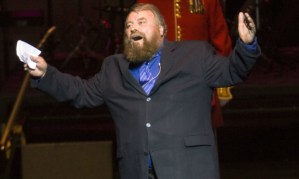Michael Coveney: Shakespeare’s year is heralded by McKellen, Cumberbatch and a new French star
We’ll see Ian McKellen’s ”Richard III” on film and Benedict Cumberbatch’s on the small screen this year, but Thomas Jolly’s is the stand out performance

All aboard the Shakespeare bus as the quarter-centenary celebrations kick into gear. "Hold very tight please, ding ding," as the old-style conductors used to cry on the red double-deckers. And here comes Ian McKellen to punch your tickets on a guided bus tour around the London locations used to film his Richard III movie in 1995: "Hold merry tights, please, king king."
The sleek movie made by Richard Loncraine, based on Richard Eyre‘s National Theatre production, was updated to the 1930s and featured a great cast led by McKellen’s serpentine, jack-booted, cigarette-smoking Mosleyite fanatic: Jim Broadbent as Buckingham. John Wood as the dying Edward IV, Nigel Hawthorne as Clarence, Robert Downey Jr as Rivers, Maggie Smith as the Duchess of York and Kristin Scott Thomas as Queen Anne. McKellen will put on his conductor’s cap during the BFI’s Shakespeare on Film season (which opens 31 March) and pick up his tour guide’s microphone to point out such landmarks as St Pancras station, the university of London’s Senate House and – scene of the battle of Bosworth field, complete with armoured trucks and tons of mud – Battersea Power Station.
Watch a clip of Ian McKellen's Richard III here
Laurence Olivier‘s Othello at the National remains the greatest performance I’ve seen by anyone in anything, yet it’s his Richard III (on stage and screen) that casts the longest shadow. So it’s appropriate that the role is so prominent this year. The other big Richard III on screen will be Benedict Cumberbatch‘s in the BBC’s Wars of the Roses sequence, following on chronologically from The Hollow Crown and Ben Whishaw‘s brilliant Richard II a couple of years ago. Dominic Cooke has directed all three parts of Henry VI (Tom Sturridge as the king) as well as Richard III, so no wonder he took a breather by doing the very short Caryl Churchill play, Here We Go, at the National.
The standard for Shakespearean performance this year has been set, for me, not by the RSC, or the Globe, but by another Richard III, that of actor/director Thomas Jolly and his company at L’Odéon in Paris (where the Théâtre de L’Europe administration has been entrusted to Stéphane Braunschweig following the death of Luc Bondy). Jolly, too, completed the three parts of Henry VI last year and this Richard is a suitably exciting pay-off to that trilogy of productions I saw in Rouen last June.
Jolly is a truly terrible enfant, an upstart crow
McKellen was a moody, Machiavellian Richard, and I’m guessing Cumberbatch will be haughtily horrible, like a gleaming gauleiter. Jolly is a truly terrible enfant, an upstart crow (as Robert Greene dubbed the apprentice playwright, his new rival), in black feathers, slithering around in a lightly emphasised calliper on his left leg, erupting from trap doors – he’s certainly the quickest Crookback since Antony Sher‘s – and ascending the throne as a rock star Mad Max at his own cyberpunk coronation concert.
"I’m a hog, I’m a toad, I’m a hedgehog…I’m a MONSTER" he rasps at full throttle in a rare departure from the fairly full, well-translated text of Jean-Michel Déprats. Other startling imagery includes the shooting of Rivers and Grey in red powder puffs, the birth of a still-born child to the dying Queen Anne (a stuffed cygnet ruffles, literally, Richard’s now-white feathers and "humanises" him a little in the downward spiral), and the appearance of a giant playroom cheval blanc ("Saddle white Surrey for the field tomorrow") which, when it topples over bearing the ghosts of the little princes, prompts the desperate cry for another horse before he’s obliterated by his own victims.

Apart from this remarkable performance, the most striking aspect of the Jolly production is the lighting, which really is the design, creating dark cells and pits in the first half, then hardening into violent shafts and poles of light that buffet the actors, creating an illuminated prison/cathedral/spider’s web/ battlefield tent, all within a nightmarish rumbling sound of death and destruction.
The Paris audience were a little reluctant to join in the party mood as the lights came up at the rock concert, perhaps understandably after the massacre at the Bataclan, and the production has received mixed reviews. But it’s a thrilling experience – the youngsters in the audience stood and cheered at the end – and Jolly is the star of the moment. When Richmond arrives to restore order and stabilise the monarchy, his cry of "Marchons" not only quotes the Marseillaise but expresses the steely soul of a nation in the aftermath of terror.














